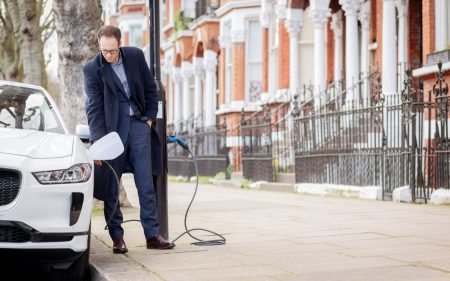We take an in-depth look at how the UK is getting ready for the switch to electric
The UK car industry has weathered several storms in recent years, with Brexit uncertainty causing significant difficulties, and Covid-19 closing dealerships and factories. But with a free-trade agreement with the EU now in place for cars, and the UK’s vaccine rollout well under way, things – while some way off being ‘normal’ – are more optimistic than they have been in recent times.
The future brings more challenges, though. The Government’s confirmation in November last year that sales of new cars without significant electrification would be banned in 2030, before new internal-combustion-engined vehicles are outlawed entirely in 2035, sets a high bar for the automotive industry, not to mention car buyers.
While we have a Brexit deal that’s largely favourable to the automotive industry, strict rules-of-origin legislation means that by 2027, at least 55 per cent of an electric car must be built in the UK or EU in order for the vehicle to remain exempt from import or export tariffs. Given that batteries and motors tend to comprise a huge proportion of an EV’s value, and these components are typically made outside the UK and EU, the race is on for car makers to produce batteries and motors here and on the continent.
Such challenges present enormous opportunities, and there’s a growing sense that the UK is well positioned to hit its ambitious 2030 and 2035 targets for EV adoption, and capitalise on EU-UK trade conditions that will compel us to build our own EV tech. These targets and quotes will require sea changes both from the industry and consumers, though, so here we ask the simple question: how prepared is the UK for the EV revolution?
Small distances, big market
The UK is a small country. It only takes around two and a half hours to drive the width of England from Liverpool to Hull, or 14 and a half hours to get from Land’s End in Cornwall, to John O’Groats in Scotland.

By comparison, driving across the entire US from New York to San Francisco would involve a minimum of 43 hours on the road without stops, while crossing the breadth of Texas alone is a 12-hour endeavour.
Perhaps unsurprisingly, therefore, drivers in the UK tend to cover lower mileages than those in other countries, with the average Brit covering just 7,400 miles a year. With charge times for EVs significantly longer than filling the tank of an equivalent petrol or diesel vehicle, this means the inconvenience of topping up a car’s batteries needs to happen far less frequently here than it would in the US, for example.
The UK’s small land mass also means that it’s far less work to implement a comprehensive nationwide public charging infrastructure – a key requirement for those who regularly cover distances longer than an EV’s range – than it would be in Russia, for example. When you add in the fact that the average length of each car journey is around 8.5 miles in the UK, plus consider ‘destination chargers’ are becoming increasingly common at supermarkets, hotels, gyms and elsewhere, it’s clear that frequent top-ups, rather than big weekly charges, are likely to be the norm for many, especially those without driveways and garages. One analogy many use, for example, is that charging an EV should be approached more like topping up a smartphone battery – something that’s much easier if you have multiple chargers dotted about your house.
On top of this, we need to consider how keen us Brits tend to be on getting a fresh set of wheels. The UK market is second only to Germany’s for new cars in Europe, so our ability to get EVs on the road is significant, and ably shown by the fact that plug-in cars (EVs and PHEVs) outsold diesel models in January 2021. So while there are around 31 million cars in the UK, our fondness for buying new ones should stand us in good stead for making the eventual switch to electric faster than some nations.
Mike Hawes, chief executive of the Society of Motor Manufacturers and Traders (SMMT), believes the UK “undoubtedly” has advantages in the transition to electric vehicles in these regards. He told us: “UK consumers are often quick to embrace new technologies, we travel fewer miles on average than some other countries and we are a relatively affluent market.”
Rachel Maclean MP, under secretary of state for transport, echoed these sentiments, praising the UK’s “big market” and the fact Brits are “very keen to buy cleaner cars”.
“In 2019, we were the third-largest market in Europe for ultra-low-emission vehicles behind Norway and Germany,” Maclean added. “and that number is going up all the time.”
However small our country may be, and however keen Brits are on new cars, the uptake of EVs goes hand-in-hand with the growth of reliable, affordable and convenient chargepoints. The SMMT’s Mike Hawes said the Government’s commitment to improving rapid charging facilities was “a welcome step”, but argued that “if motorists are to be confident that recharging is as easy as refuelling, significant investment will be necessary.” He added: “In particular, EV drivers need to see a massive increase in public on-street charging, because not every driver has designated off-street parking.”
Read more: AUTO EXPRESS
It’s Time to Go Green!
If you would like to know more about Solar Panels and the PowerBanx range of home battery systems, and get a free instant quote, please complete our online form:

